In an autobiographical note written late in his life, Jonathan Swift set down an astonishing anecdote from his childhood. When he was a baby in Dublin, he was put into the care of an English wet nurse, and one day she heard that one of her relatives back in England was close to death. Hoping for an inheritance, the wet nurse jumped on a boat back to Whitehaven in Cumbria, taking the infant Swift with her. ‘When the Matter was discovered,’ Swift wrote, ‘His Mother sent orders by all means not to hazard a second voyage, till he could be better able to bear it.’ So the wet nurse kept Swift in England for two or three years, and by the time he returned home, Swift recalled, he could read the Bible from cover to cover.
Swift was a figure of great contradiction, as this massive new biography by John Stubbs makes repeatedly clear; and almost all can be summarised in this single strange story. There is the back and forth between England and Ireland. The child is a victim of adult whim and greed and fear; and yet the telling is wholly unsentimental. There is no Dickensian or Disney pathos here, but an unsparing familiarity with the foibles of the world.
Jonathan Swift was born in Dublin in November 1667, nine months after his father had died of syphilis. That he was born in Ireland made him, in the opinions of the time, Irish — ‘to his regret’, notes Stubbs; and Swift spent much of the first half of his life hating Ireland, because hating Ireland was what the English did, and Swift longed to be English. He was divided in all things. His father’s family were Royalists and colonists who had settled in Ireland, and on his mother’s side were Puritans, as if the English Civil War were still being fought in him. Dublin was a chaotic and dirty city, and Swift studied at Trinity College, and then travelled to England to work as private secretary for the elderly statesman Sir William Temple. He took orders as an Anglican priest, and went back to Ireland as a private chaplain in 1699; he returned to London to work as a government polemicist and then finally settled in Dublin in 1714, when he became Dean of St Patrick’s cathedral.
Stubbs recounts the hurly-burly of early 18th-century politics, the endless and often incomprehensible struggles between Whigs and Tories, high church and low, and locates Swift exactly in this world: as a political man, engaging in controversies over the coinage and the tax on hemp. At one point Swift defuses a letter bomb which was intended for the Lord Treasurer, but this is a rare moment of excitement. He seems to spend most of his time writing pamphlets with boring titles. ‘In 1723 Swift published a pungent tract on a question of ecclesiastical management,’ Stubbs gamely writes, and there is a lot of this sort of stuff.
He was a man of his time, in his eccentricities and habits: he distrusted fruit, which he believed would make him ill, and thought he could cure his tinnitus by riding a horse. But it is precisely those things which separate him from his age which make him interesting and often admirable. He was right about so many things. He distrusted cats; he changed his underwear frequently, against the fashion of the day; he was sympathetic towards the mad, and gave money for their care; he loved wine and paid his servants well.
This is not meant to make him sound cuddly, for he was a deeply difficult figure, and most difficult for what Stubbs coyly calls ‘Swift’s problems with women, sexuality and the body’. His romantic life — if we may call it this — was dominated by long and probably unconsummated relationships with two women called Esther. Swift met Esther Johnson when she was eight, and he was in his early twenties; he called her Stella, and wrote to her while they were apart, and lived close by her when he could. The second Esther was the daughter of a wealthy Dublin merchant, and Swift called her Vanessa. Some said he had secret liaisons with these two, and perhaps even secret children; Stubbs is uninterested in such gossip.
But that which sets Swift most starkly apart is his writing, and the women here are hardly heroines. The poem ‘A Beautiful Young Nymph Going to Bed’, written in 1634, pictures a courtesan undressing:
Then, seated on a three-legg’d chair,
Takes off her artificial hair,
Now, picking out a Crystal eye,
She wipes it clean, and lays it by.
This might look like old-fashioned misogyny, and Stubbs accepts that it may be partly this, but he also argues convincingly that Swift is here forcing his male readers to reflect upon ‘the way they define the women they find beautiful’. The true topic of the poem is the deception permitted and embraced by society. It is not exactly a feminist work, but it is a philosophical one.
Swift’s major theme was the limitation of each man’s reason. This is the grand joke of his great novel Gulliver’s Travels, which was published in 1726, about a merchant who gets repeatedly lost at sea and washes up on islands inhabited by giants, or tiny people, or speaking horses. ‘Swift’s implication, a startling one for a clergyman of his dogmatic stamp, is that no objective measure exists,’ writes Stubbs: ‘The strapping six-footer of one country is an insect in another.’ When Gulliver arrives in Lilliput, he recounts almost immediately how he managed to ‘discharge the Necessities of Nature’, and also what he was fed by the race of tiny people: 20 wagons full of meat, and ten more full of ‘Liquor’. We are each made fools by our bodies. In Brobdingnag, where the grass is 20 feet high and it takes Gulliver an hour to walk across a field, he is attacked by two giant children and a cat, and then in Laputa, the kingdom of absurd reason, he is served a mathematical meal: ‘a Shoulder of Mutton, cut into an Equilateral Triangle; a Piece of Beef in a Rhombus.’
Rampant appetite is the topic of his most vicious work. A Modest Proposal for Preventing the Children of Poor People From Being a Burden to Their Parents or Country was inspired by decades of English policy which kept Ireland poor, and in it the anonymous speaker sets out a simple scheme for the aid of the starving Irish. ‘A young healthy Child well Nursed is at a year Old a most delicious, nourishing, and wholesome Food, whether Stewed, Roasted, Baked, or Broiled,’ he advises. The satire works because it is so perfectly logical. If the English wish to treat the Irish as cattle, then why not consider them as food? This is Swift’s great quality as a satirist: he saw it all so sharply, with what the Victorian novelist Thackeray called ‘a fatal clearness’.
Although I am no relation of Jonathan Swift, I have for the obvious reason always felt a little like he was my imaginary great- great-grandfather. On some level, Swift was grandfather of us all, and we need his works in our age of fundamentalism and appetite, for surely we are living still in what he called a confederacy of dunces. Just because he was so serious does not mean he was not funny, and the jokes are the centre of the satire. He also said: ‘He was a bold man who first ate an oyster’ (he was right about so many things). Jonathan Swift was not always a charming writer, but he was a necessary one.
The post Fierce indignation appeared first on The Spectator.
Got something to add? Join the discussion and comment below.
Get 10 issues for just $10
Subscribe to The Spectator Australia today for the next 10 magazine issues, plus full online access, for just $10.
You might disagree with half of it, but you’ll enjoy reading all of it. Try your first month for free, then just $2 a week for the remainder of your first year.

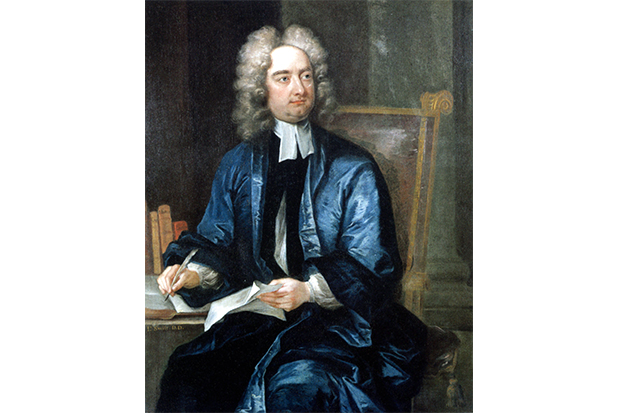
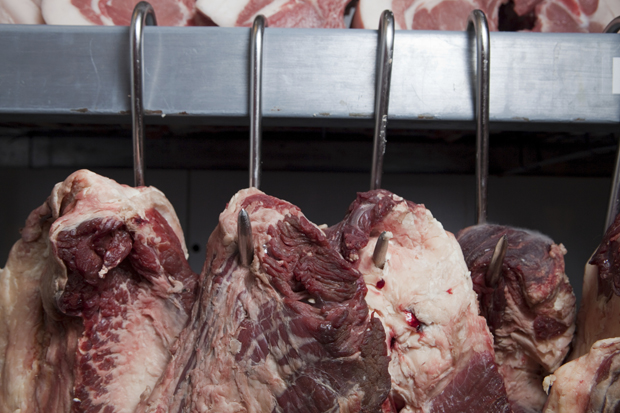


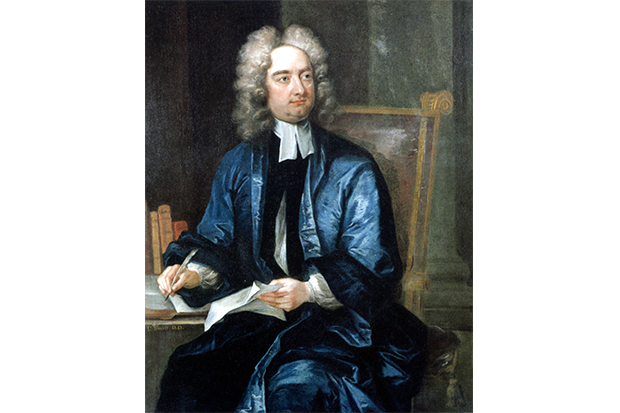
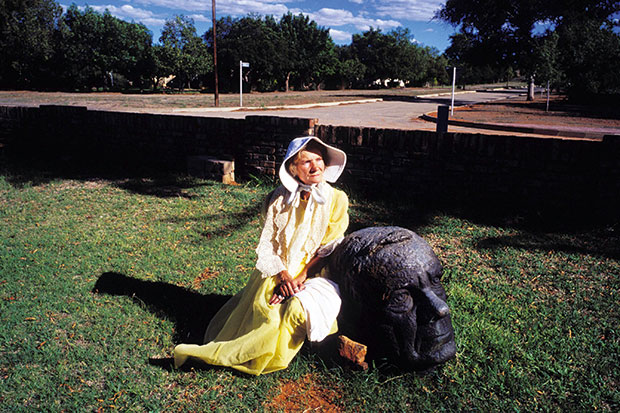
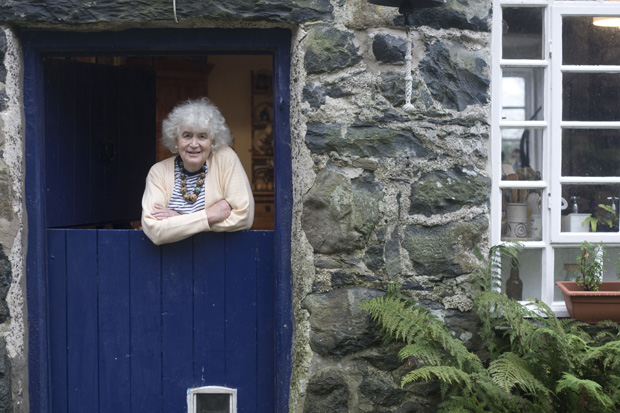






Comments
Don't miss out
Join the conversation with other Spectator Australia readers. Subscribe to leave a comment.
SUBSCRIBEAlready a subscriber? Log in